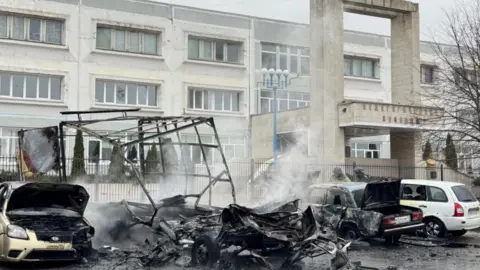Russia: Schools and shops shut in Belgorod amid air strikes
 Reuters
ReutersShops and schools have been closed in the Russian city of Belgorod after bombardments that authorities there have blamed on Ukraine.
Belgorod governor Vyacheslav Gladkov said two people were killed - as voting continues in a general election Vladimir Putin is certain to win.
Air defence systems downed eight Ukrainian missiles, Mr Gladkov said.
Mr Putin accused Ukraine of trying to disrupt his bid for another six-year term.
Students in Belgorod - which is near the border with Ukraine - will not attend school on Monday and Tuesday, the governor said. Shopping centres in Belgorod will be closed on Sunday and Monday, Mr Gladkov added.
Mr Gladkov said one woman was killed in a car park while with her son, as they walked a dog. "Medics are fighting for her son's life," the governor added.
Images circulating on social media show a car park billowing with smoke and fire. Belgorod has been the target of several retaliatory strikes from Kyiv.
The Russian defence ministry confirmed that it had "inflicted losses" in the border areas of Ukraine and the Belgorod and Kursk regions.
Also on Saturday, the governor of the Samara region - southeast of Moscow - said Ukrainian drones targeted two oil refineries.
In a post on Telegram, Dmitry Azarov said one of the refineries, in Syzran, had been set alight but there were no casualties.
A Ukrainian source told Reuters Kyiv's SBU intelligence agency struck three Samara region Rosneft refineries - in Syzran, Novokuibyshevsk and Kuibyshevsk.
Kyiv has not commented about the attacks in Belgorod.
The elections, which are described as neither free nor fair by critics, are set to see Mr Putin win six more years in office. The result is not in doubt as Mr Putin has no credible opponent.
Potential candidates who opposed Russia's invasion of Ukraine were barred from running. Mr Putin's most vocal critic, Alexei Navalny, died suddenly in an Arctic prison last month.
Mr Navalny's spokespeople have accused the Kremlin of killing the politician. These suggestions have been vehemently denied by the Russian government.
His widow, Yulia Navalnaya, called on Kremlin opponents to go to polling stations en masse at noon on Sunday to protest against the election.
Despite these elections being skewed in Mr Putin's favour, voting on Friday was filled with acts of vandalism at polling stations.
 Reuters
ReutersIncidents of vandalism involved green dye being poured into ballot boxes, the boxes being set alight and fireworks being set off inside polling stations, state media reported.
"They try to scare us, but this is not a nation that can be intimidated," 68-year-old Elena Kirsanova told AFP.
On Saturday, the ruling United Russia party said it had endured a large-scale hacking attack on its website, as reported by AFP.
Voting is taking place in Russia over three days until Sunday, spanning several time zones. Polling stations opened in the Kamchatka Peninsula, Russia's easternmost region, at 08:00 local time on Friday (20:00 GMT on Thursday) and will finally close in the westernmost Kaliningrad exclave at 20:00 on Sunday.
